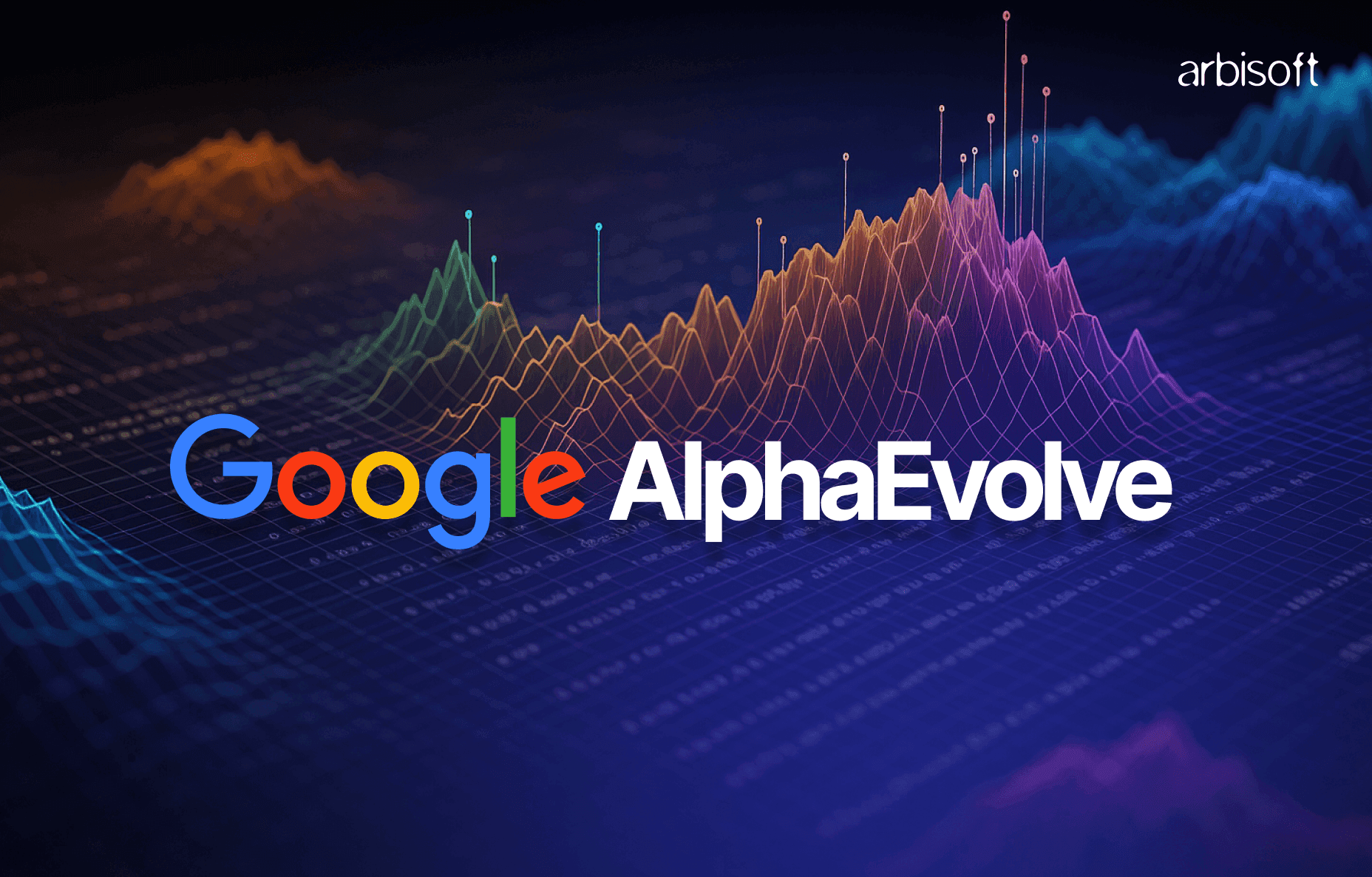We put excellence, value and quality above all - and it shows




A Technology Partnership That Goes Beyond Code

“Arbisoft has been my most trusted technology partner for now over 15 years. Arbisoft has very unique methods of recruiting and training, and the results demonstrate that. They have great teams, great positive attitudes and great communication.”
AlphaEvolve: Google’s AI That Designs Algorithms Beyond Human Capability

AI has long been known for generating text, answering questions, and powering chatbots. But what if it could do something much more basic, design new algorithms that perform better than ones made by humans? That’s exactly what Google DeepMind’s AlphaEvolve is doing. Built on the foundation of the Gemini large language models, AlphaEvolve is not just another AI model. It’s a system that can independently create, test, and improve new algorithms that are already solving real problems at Google’s scale.
Unlike earlier systems, AlphaEvolve doesn’t just generate working code. It finds efficient, verifiable, and often groundbreaking solutions to very complex problems in computer science and mathematics.
What Is AlphaEvolve?
AlphaEvolve is an advanced coding agent trained to automate the process of designing and optimizing algorithms. It is built using a mix of Google’s Gemini Flash and Gemini Pro models. These models work together in a loop to create, test, and improve candidate algorithms.
Here’s how it works:
- Gemini Flash explores a large number of algorithm possibilities, focusing on creativity and speed.
- Gemini Pro improves the best-performing ones by using deeper reasoning, optimization, and detailed analysis.
These models work together in an evolutionary setup, where candidate solutions are tested, rated, and improved based on measurable results like performance speed, accuracy, or resource use. Poor performers are removed, while better ones are improved step by step.
Think of it as a digital research lab that never sleeps. It keeps coming up with new ideas, running tests, checking results, and creating better answers over time.
What Makes AlphaEvolve Unique?
Most coding assistants, like GitHub Copilot or ChatGPT’s code generation tools, offer useful code snippets based on known patterns or public data. They help write software faster but don’t create new knowledge. AlphaEvolve is different in four big ways:
- Self-Improving Loop: It doesn’t stop after creating one solution. It keeps improving solutions over time by repeating the process.
- Automated Evaluation: Every algorithm it creates is tested for performance and correctness using benchmarks, simulations, or test suites, without needing human help.
- Interdisciplinary Impact: It’s not limited to just software. AlphaEvolve can work across different fields, from improving data centers to solving open problems in mathematics.
- Human-Readable Results: Unlike black-box neural networks, the results from AlphaEvolve are often easy to understand and ready to use. This makes it easier for engineers to use them in real-world systems.
Real-World Applications and Results
AlphaEvolve has already been applied to real-world engineering and computer science problems, with impressive outcomes:
1. Data Center Scheduling
AlphaEvolve optimized Google's Borg system, which manages compute resources across global data centers. The AI discovered new heuristics that improved efficiency by 0.7%. While that may sound small, it translates to major resource savings at Google's scale.
2. Chip Design
In hardware engineering, AlphaEvolve modified Verilog code for arithmetic circuits in Google’s next-generation Tensor Processing Units (TPUs). These AI-generated changes passed all verification tests and are now part of Google's chip design process.
3. Kernel and Model Optimization
In one case, AlphaEvolve improved the FlashAttention kernel, a performance-critical component in training large models. The result was a 32.5% speed increase, a task that even expert engineers struggled to optimize manually.
It also accelerated matrix multiplication in Gemini’s training pipeline, resulting in a 1% overall reduction in training time, a substantial cost and time saving when training large AI models.
Contributions to Theoretical Mathematics
Beyond applied engineering, AlphaEvolve has made surprising progress in theoretical mathematics:
- It discovered a new way to multiply 4×4 complex matrices using just 48 scalar multiplications, beating the previous best of 49 set in 1969.
- When tested on over 50 open math problems in areas like geometry and combinatorics, it matched the best-known solutions in 75% of cases and exceeded them in 20%.
- It solved previously unsolved packing problems, such as the optimal arrangement of 11 or 12 hexagons inside a larger hexagon.
These breakthroughs show AlphaEvolve’s ability to explore mathematical spaces in ways humans may not have considered.
Scientific and Industrial Potential
AlphaEvolve could transform how scientists and engineers approach complex challenges. Because it focuses on algorithm discovery, it can be applied to almost any domain where computation and optimization matter, including:
- Drug discovery
- Material science
- Robotics and logistics
- Climate simulations
- Financial modeling
It helps researchers translate problems into code and find solutions that are both novel and verifiable, often faster than traditional research methods.
What’s Next for AlphaEvolve?
Google DeepMind is building a user interface for AlphaEvolve and plans to launch an Early Access Program for academic researchers. This move could accelerate collaboration across science, engineering, and mathematics.
AlphaEvolve is more than an AI assistant, it’s a problem-solver, a research partner, and a system capable of independent algorithm discovery. As it matures, we’re likely to see more breakthroughs that would have previously taken years of human effort. This marks a major step forward in the use of AI to advance human knowledge.
























